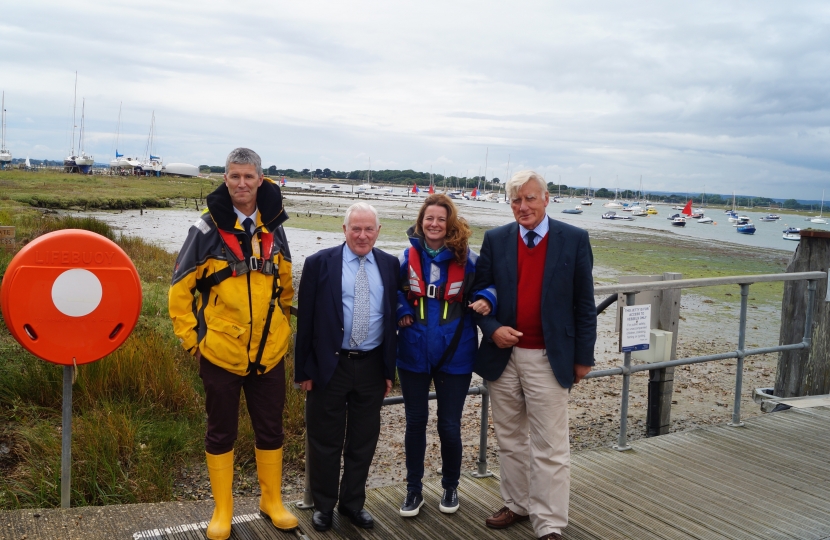
The condition of the Chichester Harbour and its water quality is an issue I’ve been concerned about for some time and I’ve been undertaking work on this myself and with colleagues which I will outline in greater detail below. However, the findings in the recent court case against Southern Water were truly shocking and unacceptable. This fine of £90million sets a record as the largest handed down by the Court following an investigation by the Environment Agency. It relates to 51 offences that took place across Sussex, Hampshire and Kent between 2010 and 2015, including instances in our area around Chichester, Bosham and Thornham. Southern Water, as with all water companies, has a responsibility to operate within its permit conditions as agreed with the Environment Agency. This fine reflects a period of deliberate, widespread and repeated offences that cannot be tolerated. It is right that companies who fail in their duties to the environment are held accountable. Importantly for consumers, this fine will be paid solely from Southern Water’s operating profits to make sure this is not passed onto customer bills.
I know that many may be concerned about the length of time taken to reach this stage. A large part of this is due to the amount of work involved in the evidence-gathering process in order to reach the criminal standard of proof required to bring charges.
The Government’s much-anticipated Environment Bill will introduce ‘Drainage and Sewerage Management Plans’ (DWMPs) on a statutory basis, with annual reviews and five-year improvement plans. DWMPs will require that each sewerage undertaker must prepare a drainage and sewerage management plan that will address relevant environmental risks and how they are to be mitigated. The ambition behind DWMPS and increased levels of monitoring, oversight and transparency, will look to ease the burden on the Environment Agency in their role bringing enforcement action against water companies who don’t meet their obligations to consumers and the environment.
Since this fine was handed down, I have spoken with Ian McAulay, the current Chief Executive of Southern Water who took up his role in 2017, and he has apologised on behalf of the company and the board of directors for these failures. I made clear to Ian that there is a long way to go for my constituents to trust that Southern Water will protect their interests and for the company to improve its behaviour. Southern Water has committed to significantly improve its performance and transparency and I’m looking forward to seeing this outcome realised.
My office has been contacted by a number of constituents who’ve raised their concerns that storm discharges have continued to take place, even since this fine was handed down. Storm overflows were designed to be used during extreme weather to prevent sewers becoming overloaded with a combination of sewage and rainwater, releasing diluted wastewater into watercourses rather than letting it back up into people’s homes. However, the Department for the Environment has acknowledged that climate change has led to increased rainfall and water infrastructure has not kept pace with development growth over decades. You may also be aware of the report from Natural England published in February that identified most of the AONB SSSI (Site of Special Scientific Interest) in Chichester Harbour as ‘unfavourable declining’. After its publication, I met with Natural England’s Area Director, James Seymour and Susan Taylor, the Cabinet Member for Planning at the District Council to discuss the report and what it means for our area. This report will give the Council and Natural England a body of evidence to reference when considering future planning applications and will also allow for greater pressure to be placed on Southern Water and Ofwat, as the water regulator, to take action and release additional funding for necessary work and improvements in order to cope with increased rainfall and extreme weather incidents. You can read the full contents of this report as well as Natural England’s recommendations at the following link: http://publications.naturalengland.org.uk/publication/5535304204419072
This report has also prompted the Environment Agency to review the terms of Southern Water’s permit and the circumstances in which they’re permitted to discharge during periods of heavy rainfall. I recently met with Simon Moody, the Director for our area at the Environment Agency to get an update on this. Technical work by consultants into Southern Water’s capacity and capabilities is ongoing, but Simon emphasised to me the complexity of this process and that much will hinge on the company’s infrastructure investment plans going forward and that he’ll update once this review is completed.
On investment, some may be aware of the recent acquisition of Southern Water by Macquarie Asset Management who have acquired a majority share in the holding company. This acquisition was made following discussions with Ofwat, as the water industry regulator, and my previous meetings with their Chief Executives where I made clear the need for Southern Water to significantly invest in their infrastructure serving our area. Centrally for those of us around Chichester, Langstone and Pagham Harbours, Macquarie have announced an injection of over £1billion in Southern Water and it’s holding companies, including £530million directly into Southern Water that is targeted at making necessary improvements to treatment works, pumping stations and the sewer network. This injection is part of a plan to assist Southern Water invest approximately £2billion over the remaining business cycle, equating to around £1,000 per property that is served by their network. I was pleased to note Macquarie’s commitment to a zero-tolerance approach to environmental pollution and that they have announced their commitment to a 50% reduction in incidents compared to 2019 levels.
The work by the Environment Agency, as well as the new financial investment in Southern Water is very welcome and I’m encouraged by what I’ve heard so far. It is important, however, to understand that improvements to infrastructure will take time to put into place. However, words are one thing, action is quite another. Please be assured that I’ll be monitoring both the EA’s and Southern Water’s work closely and playing my part to ensure that our beautiful harbours receive the protections and investment they need.
More broadly, as part of my work to better protect the waters around our area, I’ve also met on several occasions with Rebecca Pow MP, the Minister for the Environment, along with my fellow Members of Parliament, Alan Mak MP (Havant) and Rt. Hon Penny Mordaunt MP (Portsmouth North) whose areas are also served by Southern Water. Together we’ve established a forum of MPs across the south who are being similarly affected by contaminated water pollution by Southern Water, either along the coast or in rivers and are collectively channelling our efforts and to look into any immediate action.
The formation of this group earlier this year led to renewed efforts by Southern Water to tackle the problem. They have joined another group that looks to bring together key decision-makers from across the area to discuss how to best protect the Harbour, known as the ‘Chichester Harbour Protection & Recovery of Nature Group’ (CHaPRon). In previous meetings with Southern Water’s Chief Executive, I have put the data from Natural England and the Environment Agency to him. He has acknowledged the real issues faced by the Harbour and is continuing to work towards better collaboration between the company, Chichester District Council as the local authority, Natural England, the Environment Agency, the Chichester Harbour Conservancy and other agencies who are tasked with protecting and enhancing the Harbour. CHaPRon’s work will be fed up to the MP forum and it’s my hope that this initiative, alongside improvements to monitoring and data capture, will ensure a more joined-up and solution-focused approach to addressing the effects on water quality.
I‘ve also discussed these issues with the former and current Chief Executives of Ofwat who regulate the water industry. During my discussions, I’ve been assured that Ofwat and the Environment Agency are working closely to ensure alignment on priorities to protect the environment, as well as consumers. Importantly, allowances for improvement and growth are factored into the financing arrangements agreed between Ofwat and Southern Water. Some will also be aware of Ofwat’s £126million penalty to Southern Water in 2019 following serious failures at its sewage treatment sites and for misrepresenting its performance.
At a national level, I was encouraged by the latest update from the Storm Overflows Taskforce who have announced a collective agreement on a long-term goal to end pollution from storm overflows. Following recommendations from the Taskforce, made up of DEFRA, the Environment Agency, Ofwat, Consumer Council for Water, Blueprint for Water and Water UK, water companies will be required to provide greater transparency around when and how storm overflows are used. I am pleased that water companies have agreed to make real-time data on sewage discharges available at bathing sites all year round, meaning surfers, swimmers and other water users can check the latest information, especially after heavy rainfall. They will also accelerate work to install monitoring devices to create a complete picture of their activity by 2023. You may be aware of the ‘Beachbouy’ service which Southern Water has committed to continually improve going forward.
I also know that Rebecca Pow MP, Environment Minister at DEFRA met water company CEOs in September 2020 and made clear that the volume of sewage discharged into rivers and other waterways in extreme weather must be reduced. It is good to know that water companies are already committed to a significant programme of improvements to the monitoring and management of storm overflows at a cost of around £1.2 billion, including over 700 schemes to provide environmental improvements by reducing spills from frequent overflows. As part of this investment, ‘Event Duration Monitoring’ is currently being installed on most storm overflows to trigger investigations and improvements by water companies when overflows operate too frequently.
It's clear there is much more to do and I will continue to play my part within the regional forum of MPs by bringing together the relevant bodies and agencies to explore any further action which can be taken to protect our beautiful harbour.
For those who’re not aware, on 25th June 2021, I held the Chichester Community Conference that brought together an expert panel to answer residents’ questions on key local issues around planning, development, infrastructure, and the environment. On the panel were representatives from Southern Water, both local councils, the Environment Agency, Natural England and Highways England and we discussed many of these issues. In case you were not able to attend, CLICK HERE


